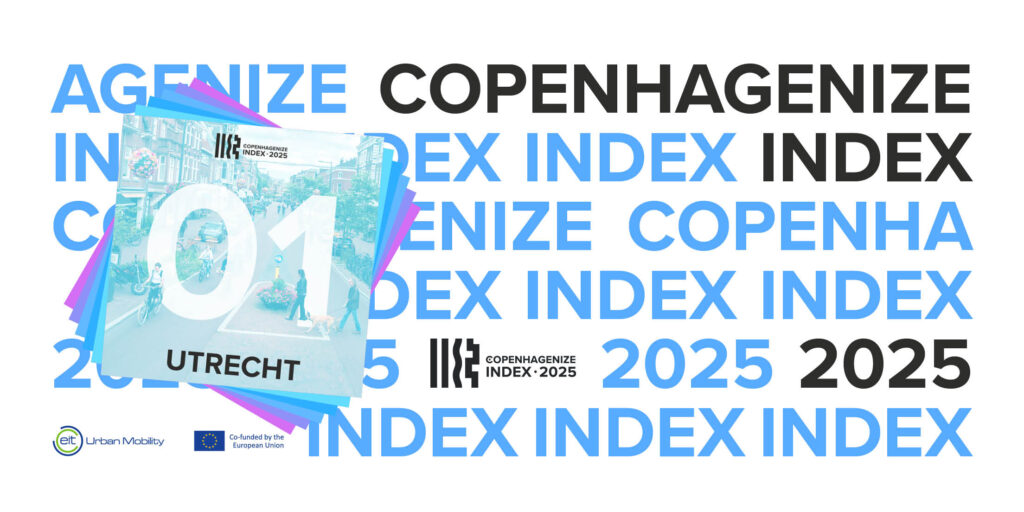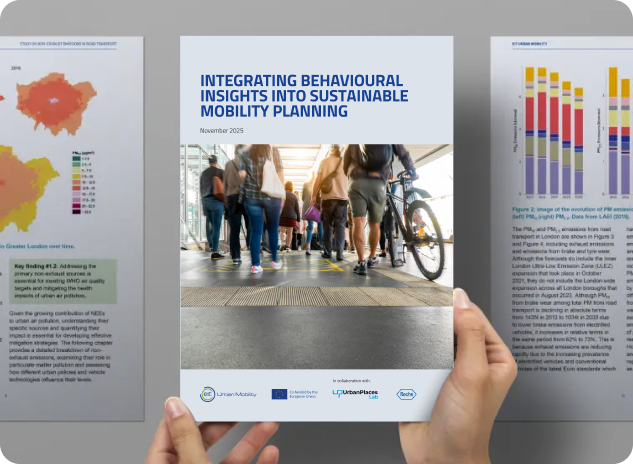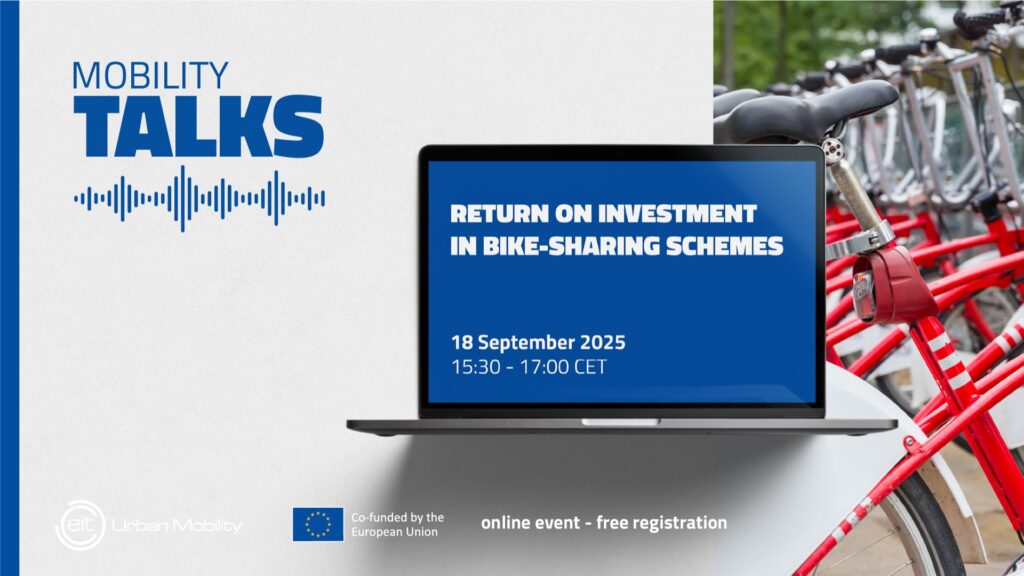Mastering mobility with women-led innovation

Cities and transport systems are not neutral. Throughout Western history they have largely been planned and built by men around male-dominated travel patterns. This legacy is visible in everything from street lighting to public transport schedules, and it has often meant that women’s needs – for safety, care-related trips and flexible mobility – have largely been under‑served. Initiatives on gender‑mainstreaming in mobility reveal structural biases and design choices that systematically […]
Mastering mobility after dark

Across Europe, millions of people travel after dark: commuting from late shifts, cycling home, walking through neighbourhoods or using scooters to bridge their last mile. In winter, when darkness falls early but daily life continues, people still need to get to and from work, education and essential services, often in conditions that make navigating streets and public space more […]
Mastering mobility with decarbonised last-mile logistics

While the end-of-year holiday season offers a peak in global logistics, the beginning of the year sees a surge of delivery traffic with consumers returning gifts and placing new orders. Due to this increase in ecommerce returns, city streets become congested and local air quality worsens. According to a 2024 World Economic Forum report, last-mile logistics, the final leg of delivery from an urban […]
Mastering mobility with EU battery regulations

Batteries sit at the heart of Europe’s transition to decarbonised mobility. As the Clean Energy Technology Observatory notes, transport electrification prevented 658 million barrels of oil equivalent from being burned between 2010 and 2022, avoiding 280 million tonnes of CO2 globally. In the EU alone, batteries cut oil imports by 120 million barrels and prevented 51 million tonnes of emissions during […]
The Copenhagenize Index 2025 – EIT Urban Mobility Edition

The one-of-a-kind Copenhagenize Index 2025 reveals the 100 cities worldwide that are transforming their streets to develop cycling as a main mobility solution. Six years after its last edition ranking bicycle-friendly cities, and following a pandemic that reshaped our daily mobility habits new questions have arisen: which global cities are truly investing in transforming their streets for […]
Mastering mobility at Tomorrow.Mobility World Congress 2025

For its fifth year, Barcelona became the meeting point for the world’s leading mobility innovators, researchers and policymakers as the Tomorrow.Mobility World Congress (TMWC) returned to Fira Barcelona from 4-6 November. Co-organised by Fira Barcelona and EIT Urban Mobility, the event ran alongside the Smart City Expo World Congress, welcoming over 27,000 attendees from more […]
Integrating behavioural insights into sustainable mobility planning

Objectives & methodology: This report was developed during a workshop with 15 psychology and mobility experts, complemented with literature review. It aims to: Highlight and understand the main psychological factors impacting people’s mobility decisions Identify mobility offers and demand-side strategies that motivate sustainable behaviour Provide recommendations to public and private entities for targeted interventions supporting […]
Study on return on investment in bike-sharing schemes
A multidimensional impact Bike-sharing schemes save 46,000 tons of CO₂e yearly, but their real value lies in broader societal gains. By replacing car trips, they slash air pollution, preventing 968 chronic diseases and saving €40 million in healthcare costs. They also ease traffic, reclaiming 760,000 hours lost to congestion—worth €30 million in productivity gains. And […]
Mastering mobility with car-free days

Car-free days are deliberately scheduled interruptions of private motor traffic, typically lasting for a full day. During these events, streets or entire districts are cleared of cars and reclaimed for walking, cycling, public transport and community life. The result is an immediate transformation: quieter streets, cleaner air and space for people to enjoy, rather than […]
Mobility Talks 31: Return on investment in bike-sharing schemes

In this Mobility Talks, we will explore the findings of a new study by EY, commissioned by EIT Urban Mobility and Cycling Industries Europe, on the return on investment in bike-sharing schemes. The session will offer insights into the quantification of the tangible and intangible benefits of bike-sharing—spanning health, environmental, and economic impacts—across European cities. The discussion […]
Mastering mobility with urban greening

Around the world, cities have become hotspots for heat, with the urban heat island effect making urban temperatures 10-15°C higher than nearby rural areas during peak summer periods. In the summer of 2025, heatwaves impacted large parts of Europe as early as June, pushing cities beyond their abilities for mitigation. As an estimated 75% of […]
Mobility Talks 30: Public transport innovations

Public transport systems across Europe face mounting pressure to become more resilient, efficient, and inclusive. This Mobility Talks explores how technological public transport innovations and new business models can provide solutions to these challenges. From improved demand management and operations to better data collection and exploitation, we’ll examine how public transport authorities and operators are responding to […]
Mastering mobility with mobility justice

How people move through their cities, or are prevented from freely moving, may seem like a commonplace infrastructural issue but at the core of the issue lies fairness, power and opportunity. Transportation systems reflect decades of decisions informed by political parties and movements, patterns of exclusion and reinforcement of power structures. Mobility justice asserts that […]
Strategic Research Priorities and Gaps 2025 Report
EIT Urban Mobility Academic Research Board June 2025 This first ‘Strategic Research Priorities and Gaps’ 2025 report, from the EIT Urban Mobility Academic Research Board, outlines the urgent and transformative challenges in urban mobility and identifies present and upcoming research priorities in urban mobility in Europe and beyond. Framed around five key focus areas—economic productivity, […]
Mastering mobility with non-exhaust emissions

As cities work to achieve their emissions reductions goals and implement changes for more sustainable transport systems, the focus has long been on reducing vehicles’ exhaust emissions. However, a less visible but increasingly significant source of pollution has persisted: non-exhaust emissions (NEE). Non-exhaust emissions are particles that get released into the air from parts of […]
Study on non-exhaust emissions (NEE) in road transport

Why this study matters More than 96% of the European population was exposed to PM2.5 concentrations exceeding the World Health Organization’s annual air quality guideline limit in 2022 .Road transport is a primary source of particulate matter in urban areas. As exhaust emissions decrease, non-exhaust emissions (NEEs) – particles from brake, tyre and road wear […]
Mobility Talks 29: Efficient public space management for better mobility systems

The growing urban population in Europe means that competition for public space management in cities is increasing. At the same time, existing mobility solutions and new mobility services put even more pressure on streets, sidewalks, and parking spaces. This is true for passenger mobility but also for the movement of goods in urban areas. The […]
Mastering mobility with child-friendly mobility planning

As cities across Europe grow and populations flock to urban areas, inclusive urban planning becomes a requirement. Public spaces, transport systems, streets and sidewalks must be accessible not just to the able-bodied adult majority, but to the entire community, including our youngest residents. Children, often overlooked in planning decisions, experience cities in unique ways, but […]
Mastering mobility: the untapped potential of urban waterways

Throughout history, cities have been established along rivers, canals and coastlines. Vital to survival, these waterways enabled the movement of people and goods for the ever-growing populations that settled there. From the island of Manhattan to the canals of Venice, and further still, to the port of Shanghai, water-based mobility has played an essential role […]
Mobility Talks 28: Autonomous mobility: what can we expect in 2025?

2025 is expected to be a pivotal year for the commercialisation of autonomous technologies, evolving from pilots towards increased availability for a broad range of applications. From shuttles to buses, trains, trucks and cars, it is relevant to dive deeper into the different use cases enabled by autonomous mobility. In this Mobility Talk, our speakers […]
Mastering mobility with inclusiveness by design

Europe’s population is diverse, yet its mobility infrastructure often fails to reflect this reality. Mobility is a fundamental part of daily life – allowing access to work, school, health and governmental services, as well as leisure activities and social connections – and a lack of access can have profound consequences on individual physical, social and […]
Better Mobility Trendreport 2025

The Better Mobility Trendreport 2025 is a collaboration between EIT Urban Mobility, Impact Hub Vienna, and Point&. Based on data from 300+ mobility innovations and 100+ experts across Europe, it highlights emerging trends, identifies new business opportunities, and outlines actionable steps for transformation. Key findings For the Better Mobility Trendreport 2025, mobility practitioners have been […]
Mastering mobility: public space and public health

Research conducted by UN-Habitat has found that ‘well-functioning cities have around 50% of their surface area dedicated to public space.’ Public space offers opportunities for people who live, work, and play in the city to connect with one another, nature and the built environment. Public space design has been found to significantly influence the mental, […]
Gender mainstreaming for inclusive mobility

Mobility and transport are not gender-neutral. The persistent inequalities in both the labour market and household responsibilities also impact gender differences in mobility, particularly in travel patterns. According to Point&’s Report Data & Diversity in mobility, women have more complex and multimodal trip patterns, more safety concerns during travelling and use more public transport than […]